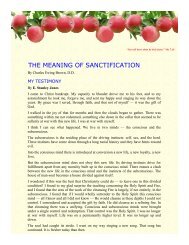W. B. Godbey - Enter His Rest
W. B. Godbey - Enter His Rest
W. B. Godbey - Enter His Rest
You also want an ePaper? Increase the reach of your titles
YUMPU automatically turns print PDFs into web optimized ePapers that Google loves.
The Campbellite dogma of confession and baptism actually takes away the convictions by rendering the sinner<br />
independent of Christ. No one ever does get pardoned till he has given up everything else, finding his own good<br />
works all “filthy rags in the sight of God.” With this universal surrender he must also give up that dogma of<br />
remission by immersion, otherwise he will never be able to reach that utter desperation of all earthly resources<br />
which must inevitably antedate his total, unreserved and eternal abandonment at the feet of Jesus, and the final<br />
ejectment of his hopeless soul on the mercy of God in Christ; which is absolutely necessary to bring him into a<br />
position to receive the free pardon of all his sin. Therefore these false prophets with their legalism actually head<br />
off the sinner from Christ and put him on this greased plank of legalism, on which he slides down to Hell.<br />
In my world-wide travels, when seeing the millions of idolaters, and preaching in the midst of their temples and<br />
shrines and amid millions thronging the holy rivers to wash away their sins in those sacred waters, or, a matter<br />
of convenience to the people living far away from those holy rivers, washing in the holy tanks, that they might<br />
be saved, thus actually worshipping those holy waters; I often thought about the myriads in Christian lands who<br />
are wedded to idolatry in different forms and phases. Hydrolatry, I. e., water worship, is very prevalent. <strong>Rest</strong><br />
assured that every person who believes in baptism in order to the remission of sins, or in any way regards it as a<br />
saving ordinance, is a hydrolater, I. e., a water worshipper, which is a form of idolatry exceedingly prominent in<br />
heathen lands, and has been developed more or less in the Church in every age.<br />
With the Roman and Greek Catholics, Maryolatry, I. e., the worship of the Virgin Mary, which is none other<br />
than a species of idolatry, has actually captured three hundred and fifty millions of people who wear the<br />
Christian name.<br />
Eucharolatry, I. e., the worship of the sacramental elements, has not only swept Catholicism in all lands, but the<br />
thirty millions of Lutherans throughout the world, I am sorry to say, are by no means free from it. Luther found<br />
the Church, just having passed through the Dark Ages (a thousand years, during which not one man in a<br />
thousand could read or write), full of idolatry. The Church remained pure till the conversion of the Emperor<br />
Constantine, A. D. 321. He did his best to stop pagan worship throughout his world-wide empire, but he could<br />
not do it. Under his potent influence millions of heathen were brought into the Church without a knowledge of<br />
God in personal experience. Therefore while they gave up their pagan worship, they soon idolized the<br />
sacraments, baptism and the Lord's Supper. They magnified them, as they imputed salvation to them. Soon the<br />
triune immersion, in a state of entire nudity and with a lot of ceremonies invented by the priests, universally<br />
prevailed. Luther found the Church wrapped in the dismal night of the Dark Ages and had so much to do that he<br />
did not get rid of all of the dogmata of priestcraft, which had found their way into the Church.<br />
The Roman Catholics hold the doctrine of transubstantiation, pursuant to which they claim that when the priest<br />
consecrates the bread, it is actually turned into the literal body of Christ, which the people eat, and the wine into<br />
the literal body of Christ, which they drink. While Luther tried to get rid of that heresy, he hung on a<br />
modification of it, which he called consubstantiation. In this he discards the popish dogma that the elements are<br />
turned into our Lord's literal body and blood; meanwhile he maintains the real presence of the body and blood.<br />
Therefore the people under his reformation still held on to the papistical dogma of sins forgiven in the<br />
sacrament.<br />
I remember an illustrative case. A profane, drunken German had married a very bright and spiritual Methodist<br />
woman. He was learned and intellectual, but really a wicked man. Though born a Lutheran, when I invited the<br />
Christians to the sacraments on the Sunday morning of the quarterly meeting, he came from the rear of the<br />
congregation and took his place among the communicants.<br />
Afterward some of them asked him why he did it, as he was a notorious sinner. He told them he did it because<br />
he wanted his sins forgiven. He was no Christian, but an eucharolater, I. e., an idolater, worshipping the Lord's<br />
sacrament; just like the man who receives baptism in order for the remission of his sins.<br />
Another form of idolatry common in Christian lands is eccelesiolatry, I. e., church worship. It is very extensive<br />
and growing rapidly and is awfully detrimental to spirituality. I have often known a congregation to backslide<br />
while building a fine edifice, after the occupancy of which they never more had the Holy Ghost and the old-time<br />
power. God was grieved away because they worshipped the fine edifice. Oh, how pertinent for us to constantly<br />
pray, like the Apostle John, “Little children, keep yourselves from idols.”









